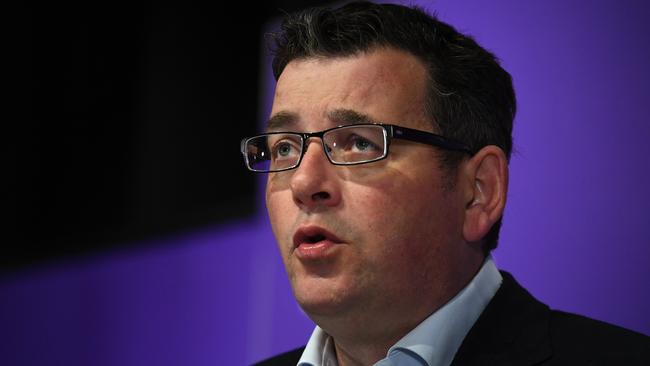Wage theft laws ‘dead on arrival’
The nation’s first wage theft laws risk being scuttled by the High Court or federal legislation.

The nation’s first wage theft laws risk being scuttled by the High Court or federal legislation as employers revolt over Victorian government moves to jail bosses for up to 10 years for deliberately underpaying workers.
National employers and a prominent workplace lawyer said Victoria’s proposed landmark wage-theft laws, which the Andrews government and unions are confident will be passed by the state’s upper house this week, risked a constitutional challenge in the High Court.
Federal Attorney-General and Industrial Relations Minister Christian Porter said it was possible that state laws implemented ahead of national laws could be overridden by federal legislation.
While Premier Daniel Andrews has declared the laws the fulfilment of an election promise, employer groups have warned that their passage would increase the cost of doing business and drive jobs out of Victoria.
The Andrews government argues its Wage Theft Bill is a criminal law and within the state’s powers to legislate.
“We promised to criminalise wage theft and we will deliver on that promise,” Victorian Attorney-General and Workplace Safety Minister Jill Hennessy said on Sunday. “The existing legal regime has failed to prevent the exploitation of Victorian workers by unscrupulous employers. Our strong and robust Victorian laws will serve as a template that can be rolled out across the country.”
University of Adelaide law professor Andrew Stewart, an employment law expert, said the Victorian bill was vulnerable to a constitutional challenge and could be overridden by federal legislation.
“There are two responses: either the feds do nothing, the Victorian legislation comes into effect and someone, whether it’s the commonwealth or someone else, engineers a case to go to the High Court to say it can’t apply,” he said. “Or the feds legislate to try and stop it applying. It’s still meaningful to say there are two ways this plays out.”
As Victoria referred its powers to make laws applying to employment to the commonwealth in the 1990s, the Fair Work Act applies to almost all Victorian workers. “Almost every situation this (bill) is intended to cover is subject to federal legislation and there’s fairly clear argument that the Victorian legislation, if it is passed as we assume, will be unconstitutional because it’s inconsistent with the federal Fair Work Act,” Professor Stewart said.
Australian Industry Group chief executive Innes Willox said there was “significant doubt about the constitutional validity” of the proposed state legislation and it should not be voted on until the working groups of employers and unions examining criminalising underpayments at a federal level concluded their deliberations.
“Section 26 of the Fair Work Act excludes a state law that has as “one or more of its main purposes … providing for the enforcement of terms and conditions of employment,” he said.
“A key purpose of the Victorian Wage Theft Bill is to provide for penalties to be imposed on employers that fail to pay ¬employee entitlements or keep required pay records in certain circumstances, and to establish the Wage Theft Inspectorate. Labelling certain types of underpayments as “wage theft” does not change the character of, or the purpose of, the Victorian legislation.”
Mr Willox said the Victorian government should release any advice that it has received from the Victorian Solicitor-General on the validity of the legislation before the vote this week.
“It is not in the community’s interests for legislation to be passed that is invalid, nor is it in the community’s interests to be subjected to the uncertainty that would result from the matter being tested in the High Court,” he said.
But Victorian Trades Hall Council secretary Luke Hilakari said employers were complaining to Mr Porter in a bid to get the federal government to water down the impact of the state laws.
“No one wants to see a dummy set of federal laws whose entire purpose is to attempt to roll the states who are taking serious action against people who want to steal people’s wages,” he said.
“Every day the stories that are coming in are just getting worse and worse. You walk down Chinatown (in Melbourne).
“The average wage is somewhere between $10 and $14 an hour when the minimum wage is $19.49 an hour.
“I had a bunch of horticultural workers come in and they are getting between $3 and $6 an hour and they are feeding themselves by picking up food that falls off the back of a truck.
“It is cooked out there and everyone knows it. The other group that comes to me strongly is parents.
“They can’t believe this is their kids’ first experience in hospitality and retail — super not paid, shifts not recorded, people doing unpaid overtime, not being paid the minimum wage. This has just got to stop.”
Mr Porter said stamping out serious underpayments of wages required a nationally consistent approach.
“It is possible that any state laws implemented ahead of national laws could ultimately be overridden by the commonwealth legislation and that is something Victoria has been encouraged to consider in pursuing any state legislation,” he said.
Victorian Chamber of Commerce and Industry chief executive Paul Guerra said with federal laws soon to be introduced, the chamber opposed the introduction of state wage theft laws as they would duplicate and add to the existing “complex” federal system.








To join the conversation, please log in. Don't have an account? Register
Join the conversation, you are commenting as Logout